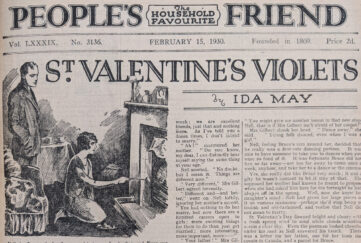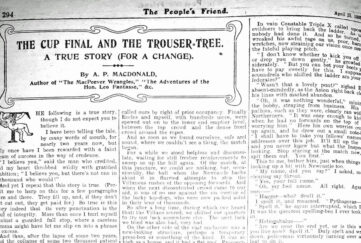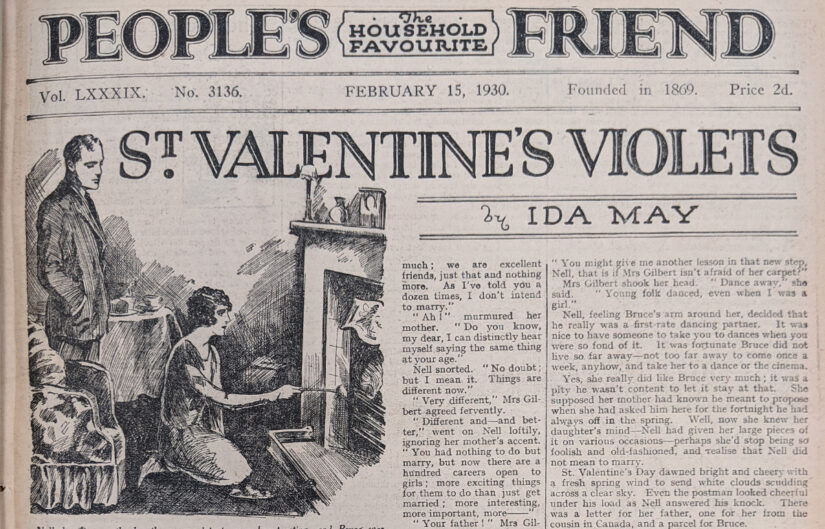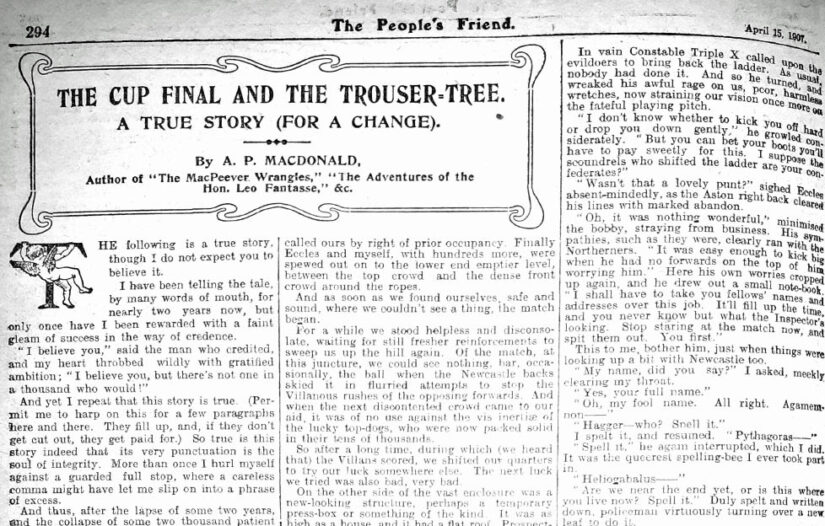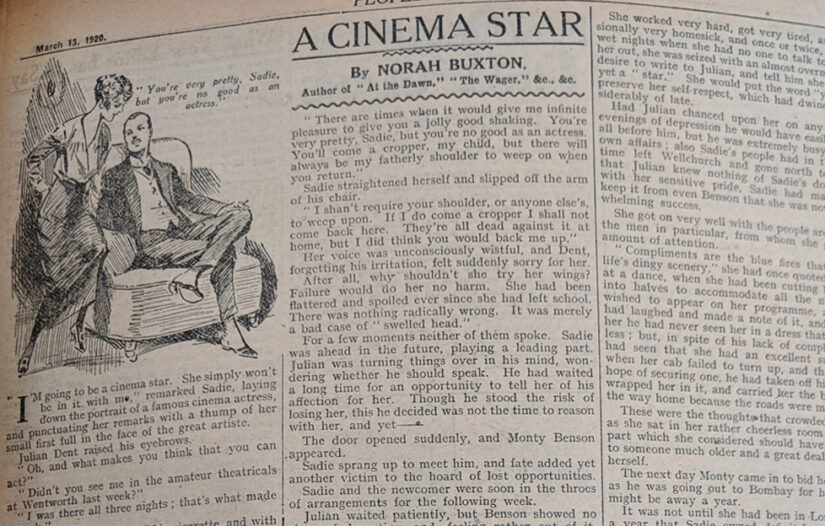Reading Between The Lines S3EP10: “I’ll Soon Be Home Again”
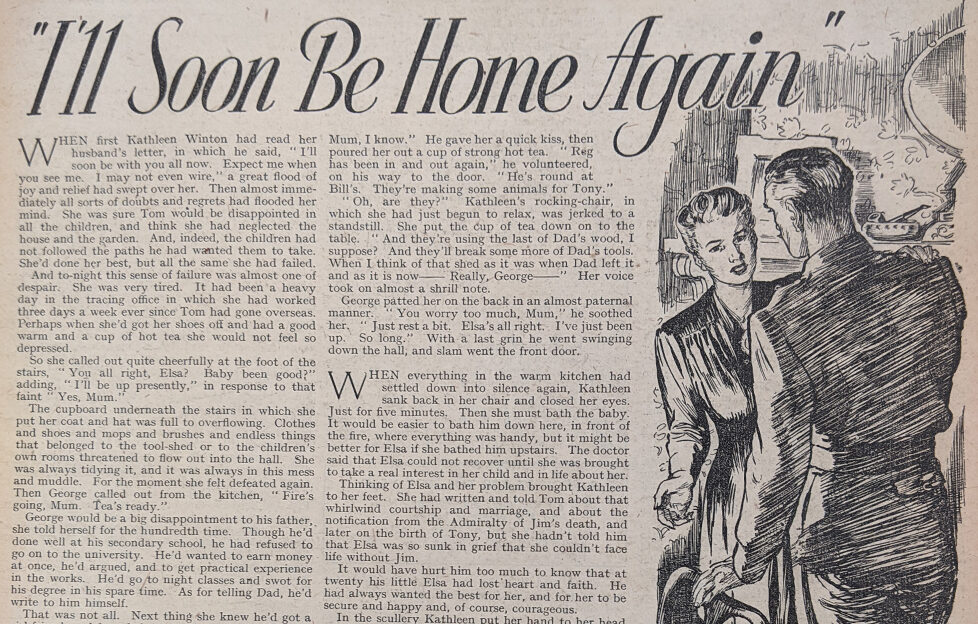
This episode of the Reading Between The Lines podcast is “I’ll Soon Be Home Again” by Elizabeth Nolan, first published in January 6, 1945. Listen along to the episode as you read and let us know what you think!
When first Kathleen Winton had read her husband’s letter, in which he said, “I’ll soon be with you all now. Expect me when you see me. I may not even wire,” a great flood of joy and relief had swept over her. Then almost immediately all sorts of doubts and regrets had flooded her mind. She was sure Tom would be disappointed in all the children, and think she had neglected the house and garden. And, indeed, the children had not followed the paths he had wanted them to take. She’d done her best, but all the same she had failed.
And tonight this sense of failure was almost one of despair. She was very tired. It had been a heavy day in the tracing office in which she had worked three days a week ever since Tom had gone overseas. Perhaps when she’d got her shoes off and had a good warm and a cup of hot tea she would not feel so depressed.
So she called out quite cheerfully at the foot of the stairs, “You all right, Elsa? Baby been good?” adding, “I’ll be up presently,” in response to that faint, “Yes, Mum.”
The cupboard underneath the stairs in which she put her coat and hat was full to overflowing. Clothes and shoes and mops and brushes and endless things that belonged to the tool-shed or to the children’s own rooms threatened to flow into the hall. She was always tidying it, and it was always in this mess and muddle. For the moment she felt defeated again. Then George called out from the kitchen, “Fire’s going, Mum. Tea’s ready.”
George would be a big disappointment to his father, she told herself for the hundredth time. Though he’d done well at his secondary school, he had refused to go on to university. He’d wanted to earn money at once, he’d argued, and to get practical experience in the works. He’d go to night classes and swot for his degree in his spare time. As for telling Dad, he’d write to him himself.
That was not all. Next thing she knew he’d got a girlfriend, and from being a happy-go-lucky boy who liked to go for long bike rides with his pals, George had become quite a highbrow and a dandy. He’d begun to wear what Reg called “soppy ties” and to treat them all at home rather disdainfully.
That had gone on for weeks, and she’d been nice to the girl because it seemed diplomatic, though she knew that George didn’t really like Russian plays and classical music.
Then suddenly he had changed again. He regained his fondness for swing, went out with his pals more often, and gradually became almost slovenly in his dress.
It was the influence of the men at the works, she supposed, but it was very trying, and she hated Tom to come home and find his elder son like this. If only he’d kept on with his studies, that would have been something, for Tom had been desperately anxious that he should get his degree in engineering and a proper start in his career.
“Tea’s ready, Mum,” George called out again.
Everything about George was outsize—his body, his smile, his kindly hands. He was really a great lumbering lad who was at a very awkward age, and even in normal times it would have been difficult to keep him spruce and tidy. But he had a way with him! Whenever she was about to scold he just grinned or handed her the evening paper or simply went out of the room. George would never quarrel with anybody, but nevertheless he quietly went his own way, just like young Reg. And, of course, she was always nagging at him to cut the hedge or mow the lawn or tidy the shed, or mend this, that and the other thing about the house.
Now she looked at him critically as he rose from the table, swallowing the last mouthful of cake she had made only last night. He’d evidently washed his face and given his hair a bit of a brush, but he hadn’t changed his suit.
“Surely you’re not going to meet Mildred in those clothes, George?” she said reproachfully. “I’m sure that if ever your father had come to me looking like that—not that he ever would!”
George scraped back his chair and grinned. “Yes, Mum, I know.” He gave her a quick kiss, then poured her out a cup of strong hot tea. “Reg has been in and out again,” he volunteered, on his way to the door. “He’s round at Bill’s. They’re making some animals for Tony.”
“Oh, are they?” Kathleen’s rocking chair, in which she had just begun to relax, was jerked to a standstill. She put the cup of tea down on to the table. “And they’re using the last of Dad’s wood, I suppose? And they’ll break some more of Dad’s tools. When I think of that shed as it was when Dad left it and as it is now—Really, George—” Her voice took on an almost shrill note.
George patted her on the back in an almost paternal manner. “You worry too much, Mum,” he soothed her. “Just rest a bit. Elsa’s all right. I’ve just been up. So long.” With a last grin he went swinging down the hall, and slam went the front door.
When everything in the warm kitchen had settled down into silence again, Kathleen sank back in her chair and closed her eyes. Just for five minutes. Then she must bath the baby. It would be easier to bath him down here, in front of the fire, where everything was handy, but it might be better for Elsa if she bathed him upstairs. The doctor said that Elsa could not recover until she was brought to take a real interest in her child and in life about her.
Thinking of Elsa and her problem brought Kathleen to her feet. She had written and told Tom about that whirlwind courtship and marriage, and about the notification from the Admiralty of Jim’s death, and later on the birth of Tony, but she hadn’t told him that Elsa was so sunk in grief that she couldn’t face life without Jim.
It would have hurt him too much to know that at twenty his little Elsa had lost heart and faith. He had always wanted the best for her, and for her to be secure and happy and, of course, courageous.
In the scullery Kathleen put her hand to her head and stood still for a moment, trying to think of all the things she must take upstairs. The enamel bath, the baby basket, flannel apron, towels, soap, sponge. Now where was Tony’s precious sponge? Even as she searched for it she knew that Reg had had it for something or other. How tiresome he was!
Elsa did just look up from the book she was pretending to read as her mother came into the room. She looked very lovely, very fragile, like a bewitched princess in a picture book. Her apricot-pink bed-jacket was a present from Jim’s mother, who was an invalid and a widow and very fond of knitting. The ribbon which tied up Elsa’s ash-blonde curls matched the jacket exactly. One of her friends had searched the shops for it and had got only a wan smile as a reward.
Kathleen knew better than to ask her daughter how she was feeling, because the doctor had warned her that that was not the line to take. The thing to do was to assume that she would be better tomorrow and would resume her responsibilities (although she had had one ailment after another and spent most of her time in bed since Tony was born). So Kathleen said brightly:
“I’ll bath Tony up here tonight as it’s so cosy and warm. I see that Mrs Wilmer has made you very comfortable. Has Tony been good?”
As Elsa merely nodded faintly and languidly picked up the novel again, Kathleen checked a gesture of impatience. She bent over the coat by the side of Elsa’s bed. She felt the baby’s feet. As warm as toast. But wet through as usual! “Grannie’ll pick you up and make you comfy in just a minute,” she whispered. Poor little pet! How good he was!
Everything ready at last, the little stool for her to sot on just by the bath in front of the fire, Kathleen faced the happiest hour of the day. It was so comforting to have a warm, drowsy baby in her arms again, to turn him over carefully, unpin him, take off his little vest, lower him slowly into the warm bath.
“Look, Elsa,” she cried, when she had dried and powdered the firm, plump little body. “Look, Elsa, isn’t he lovely?” Proudly she held up the baby for his mother’s inspection.
Elsa put down her book as if reluctant to come back to the world. She looked at her baby with sad, weary eyes. “Yes, he is lovely,” she whispered, and then immediately picked up the novel once more.
Sad at heart, Elsa finished getting Tony ready for the night. He was a dear little fellow, just at his very nicest now, and there was really no one to appreciate him but herself. George didn’t take much interest in babies, and although Reg was always making him some toy or other, he went rushing past the pram on his way indoors. If only Tom were here. Tom loved babies. He wouldn’t really have minded how many they’d had.
Kathleen was just about to give Tony his bottle when she heard the front door open and shut. She stopped to listen to the footsteps going along the hall, into the sitting room, into the kitchen, and then back along the hall. She knew by the heavy beating of her heart before that well-remembered voice called out “Anybody at home?” that it wasn’t George who had come back.
“It’s Dad,” she cried to Elsa. “It’s your dad.”
With the baby in her arms she struggled to her feet. She flung the shawl around him instinctively as she hurried to the door. She and Tom met on the landing, and at first she was so breathless with excitement that she couldn’t speak to him. It was too dark to see him properly, but he was smiling, and very big and handsome and strong. He put his arms around her, embracing the baby as well. “Why, Kathleen,” he whispered, “this is like old times.”
“Oh, Tom,” she said at last, “oh, Tom, I’m so glad you’re home!”
He kissed her again, and then he took the baby from her, as he’d so often taken a baby from her in the past. She knew that his face was serious now, and that there were questions he was wanting to ask.
“Got in to Elsa,” she whispered. “She’s so unhappy. She keeps on thinking of Jim. Perhaps there’s something you can do, Tom.”
Tom nodded, too wise to make comment. As he went in to Elsa, Kathleen felt the burden lift a little. Already things were a little bit easier, just because Tom had come back.
In the bathroom, Kathleen locked the door and leant against it. She was suddenly very tired. Though she had been expecting Tom for weeks and had known that he might walk in just like this, nevertheless his coming had been a shock. Her heart was playing odd tricks; he legs felt weak.
But in a minute or two she was washing her face and changing her dress. She had planned to buy a new dress, and to have her hair nicely set. Tom had always admired her hair, and it was looking any old how. As for the dress, though it suited her and was red, Tom’s favourite colour for her, she had worn it almost every day of his embarkation leave.
Downstairs, she put more coal on the fire and began to tidy up the kitchen. What was there to give Tom to eat? She hurried to the pantry and viewed the shelves, only to find that Reg—yes, it must be Reg—had eaten the last of that jam tart. Luckily there was enough bacon for Tom, and one egg and some potatoes to be fried up.
But where was Reg? Anxiously she glanced at the clock. After seven!
In a fever of anxiety she swept up the hearth, took a pair of Reg’s shoes and dumped them in the scullery, where they belonged, till they were cleaned.
Ever since he’d come back from that farm to which he’d been evacuated, Reg had been a handful. He wouldn’t go to school. He wouldn’t go to bed. He wouldn’t go errands. If she sent him for anything, it took him ages to get there and back. On Saturdays, sometimes, he was out the whole day, fishing or pretending to fish. On Sundays, he hammered and hammered away in Tom’s shed, making things, spoiling Tom’s tools and using his wood. Like George, he never quarrelled or argued, he just stolidly did what he wanted to do. He hated school anyway, he said in a defence; when he grew up he was going to have a farm.
“’Lo, Mum!” Like a tornado Reg had burst into the scullery and rushed into the kitchen. He held out excitedly for her inspection of a piece of wood which did faintly resemble some animal she’d seen at the zoo. “Look, Mum,” he cried, very eager and friendly, “ain’t it grand? It’s a dromedary. Dromedaries have one hump, and camels have two. It’s for Tony.”
“Don’t say ain’t,” his mother rebuked him sharply. “How many more times have I to tell you? And look at your shoes, and your suit, and your hands, and face! My goodness! Where have you been?” Without ceremony she grabbed hold of his arm and rushed him to the scullery sink. She turned on the hot water tap, and with her free hand groped about for the soap.
“Oh, Mum,” he wailed, “oh, Mum, you’ll break the dromedary. Let me put him down.” Somehow he wriggled away from her and rushed into the other room. With his back to the fire he glared at her defiantly, a small, sturdy boy, with a dirty face, tousled hair, and a very shabby, much-darned blue jersey.
“Reg,” she pleaded, suddenly realising that he didn’t know what it was all about, that he wasn’t used to such rough treatment, “Reg, be a good boy. Go in there and wash your face, and make yourself as tidy as you can.”
“I’m hungry, Mum,” he protested. “And I want to show this to Tony.”
“Tony’s asleep. And, oh, Reg, don’t be difficult, not tonight, when Dad’s just home.”
Reg gave a wild yelp. “Dad here? Where? Where is he? And where’s my victory ship? Where is it, Mum? I left it on the dresser, all ready for when he came home.”
“I’ll find the ship. I put it in a safe place. You shall have it as soon as ever I’ve made you presentable.”
Without more ado, once again Kathleen grabbed hold of her young son and swept him into the scullery. But it was too late.
There were footsteps on the stairs, and there was Tom, standing in the doorway, looking at Reg, seeing him at his very worst.
Kathleen sank limply into her chair. She felt done for, defeated. Reg was no credit to her. He was unruly and obstinate. She couldn’t do anything with him. But she had intended to have him looking clean and tidy at least when his father came home.
“Well, Reg,” Tom was saying slowly, looking keenly at his young son who had backed against the dresser, “just in from play?” Almost immediately he went on, as if sensing that Reg found it awkward to speak: “What’s that you’ve got there?”
“It’s a dromedary,” said Reg at last, handing the object to his father. “For Tony.”
Kathleen had seen that his lips were quivering, and knew that he was ashamed to have his father find him like this. He was proud of Dad, and was always telling his friends what wonderful engineer he was, building huge bridges and things .He was only a little boy after all, very small he looked beside Tom, who seemed enormous in his battle-dress.
When he saw his mother looking at him, Reg arrested a movement to touch his nose with the back of his hand. He’d suddenly got the snuffles. Where was his hanky? Almost immediately he found one thrust into his hand, a big one of Dad’s. He looked up and smiled gratefully, and Kathleen’s anger and annoyance completely melted. Without a word she got up and took the victory ship, which Reg had made as a surprise gift for Tom, out of the top dresser drawer. She handed it to Reg, and then went into the scullery, closing the door behind her. She would leave the boy to make his own way with his father.
But when Reg had gone up to bed at last, his face shining with soap, looking almost angelic in his old pink pyjamas, very proud indeed because Dad had said the ship was really well made, Kathleen flew to his defence. Tom was lighting a spill at the fire.
“He hates school, and his teacher says he’s not very attentive, but he’s got plenty of common sense and pluck, and anyway, if he’s going to be a farmer, it doesn’t matter very much if he’s not clever at lessons like George. I know he’s rough and ready in his manners—that’s because of being with the lads on that farm—but he never tells lies. I’ve never known him tell a lie, and he doesn’t answer me back. If he’s too independent, I expect it’s because he was evacuated, and since he came home I’ve been too busy to give him much attention, what with my job and Elsa and the baby and everything.”
Ash she paused for breath Tom said quietly, “From what you’ve told me, and from what I’ve seen myself, I should say he’s a boy to be proud of. I should have hated a namby-pamby son.”
“And he’s very affectionate,” Kathleen went on. “He doesn’t show it, but he’s very fond of all of us. And he adores young Tony. He’s always making him something and being disappointed because the baby’s too young to be responsive.”
Tom’s pipe was drawing nicely now and he was standing looking at Kathleen as if his eyes could not have enough of her. But Kathleen was hardly noticing. She was worked up. She must explain all about the children, about all of them, tonight. George would be in presently, and she must tell Tom what to expect.
So she burst out: “And George, George is a good boy too, grand at getting up in the morning and lighting the fire. He’s been a great comfort to me. I don’t know what I should have done without him. You’ll be disappointed because he went into the works because I know how ambitious you were for him, but all the same I’m sure he’ll do very well, because he knows what he wants and he’s a hard worker. His boss speaks very, very well of him. As for that girl, he’ll grow out of her. It’s amazing the number of things a lad grows out of.”
Tom put down his pipe in its old place, in the old bowl at the end of the mantelpiece. Seeing him do that made Kathleen realise fully that Tom was really home again, really with them, and this time for always. He took her hands in his and looked down at her very tenderly. Her cheeks were scarlet. She couldn’t say any more, feeling suddenly exhausted. Sensing her fatigue, he drew her down on to a chair.
“I’ve seen George,” he said very quietly. “We met at the corner of the road, and I agree with all you said. He’s a fine chap. He’ll do well. He’s mapping out his own career and is capable of seeing it through. As for the girl—well, when I was about his again I went out with a girl like that once or twice. I soon found out that she was a silly little snob, and I knew she’d be ashamed to be seen out with me in my old clothes. I remember that at the time I thought I was being very tactful.”
“Oh, Tom,” laughed Kathleen, “and you never told me! You always said—”
“And so you were, the only girl I ever had.”
Kathleen met his gaze for a moment, feeling suddenly young and a little confused. Then Tom said, “You’ve done splendidly with all the children. I’m very proud of the way you’ve brought them up, to be self-reliant and straight thinking. It isn’t easy for any woman in wartime. You’ve done wonders, Kathleen.”
But what of Elsa? Kathleen jumped to her feet, pushing Tom away from her.
“I’ve failed with our daughter, Tom,” she sighed.
Tom took hold of her hand.
“No, you haven’t failed,” he said quietly. “Elsa is very difficult case. I knew she would take Jim’s death hardly, because she always took her troubles hardly as a little girl. But when she was little,” he went on, “I could always appeal to her sense of justice when she was difficult or naughty. She hated to feel she was being selfish and unfair. And that was the line I took tonight, knowing that you had tried to reach her though the baby, as I would have done if I’d been at home. I reminded her of Jim’s mother. ‘You knew Jim for a few months’ I said, ‘but his mother had him all his life until you came along, and he was her only child. She didn’t even see Jim on his last leave, because he spent all his time with you, and she hasn’t even seen Jim’s child. But has she reproached you?’ I asked her.”
Tom paused, and Kathleen knew by the way he leaned against the mantelpiece that he was very tired.
“’No one can measure grief,’ I told her, ‘and I’m not going to pretend that you will ever feel the same about any other man as you’ve felt about Jim, but you’re young and your life’s hardly begun. Can the love of a bride of a few months, perfect as it may be, be compared with the love and care and the sacrifices that a mother makes over many years? If your loss is great, Elsa,’ I said, ‘what of hers?’”
Kathleen saw that Tom was distressed, but she didn’t know what to say to help, so she just sat quietly looking up at him.
“Next week,” Tom said at last, “I’m going to take Elsa and her baby down to stay with Mrs Slater. I’ve made her see that she’s been selfishly grieving over Jim. I made her cry—and that hurt me, Kathleen—but I think she’s happier now than she’s been for some time, because there’s something which she knows must be done, something that Jim would expect her to do. Poor Elsa, if only we could have spared her! It’s so easy to say, ‘Better a smile for the living than a fountain of tears for the dead.’ Hers is a faithful heart, like yours and mine, and though she will begin to smile, for a long time every little thing—”
Tom broke off abruptly as he saw that Kathleen was crying. He dried her eyes on the handkerchief which he had handed to young Reg also at a critical moment. She didn’t know which suffered most, she sobbed, wives or mothers, when they lost their menfolk in the war. But she must go up to Elsa. She would be all right, she was sure, but she must peep in at her and the baby.
Kathleen dried her eyes bravely and hurried from the room. Opening the door of Elsa’s room cautiously, at once she saw the empty bottle in the light of the dying fire. Tom must have given Tony his feed. She had actually forgotten it.
Elsa and her baby were both fast asleep. The baby was in beside her, where she would leave him till she and Tom came to bed. Elsa’s arm was around him. She already looked more at peace.
Kathleen kissed them both lightly and stole from the room. She looked in at Reg on her way down and kissed him and tucked him up. Hearing movements in George’s room she tapped on the door. Yes, it was George; he loomed enormous in his pyjamas.
“She didn’t turn up,” he grinned. “I’ve got a thriller. Thought I’d leave you and Dad to it. Good night, Mum.”
Downstairs, Kathleen found that Tom was about to fry the potatoes. Without saying very much, they finished the cooking and ate their supper. The picture of Tom sitting opposite to her in the homely kitchen was infinitely beautiful. There was that quietness in the house which can only come when a family is at last fast asleep in bed.
Just to think that she and Tom were grandparents, and still only in their early forties! She looked across at him with proud and shining eyes. He was shaking out what looked like a very fine black lace shawl. So it was, of cobweb substance, really exquisite. She handled it delicately with trembling fingers, wondering however she could use it.
“For your hair,” Tom whispered. “I’ve always loved your hair, Katie.”
And she knew, as he looked at her, that he loved her as dearly as ever.
Read and listen to our previous Reading Between The Lines stories.



